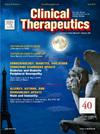Risk of Severe Outcomes From COVID-19 in Immunocompromised People During the Omicron Era: A Systematic Review and Meta-Analysis
IF 3.6
4区 医学
Q2 PHARMACOLOGY & PHARMACY
引用次数: 0
Abstract
Purpose
COVID-19 imposes a high burden on people with immunocompromising/immunosuppressive (IC/IS) conditions. This is the first large-scale, comprehensive meta-analysis encompassing major IC/IS categories to assess the risks of severe outcomes from COVID-19 in people with IC/IS conditions during the Omicron era—the period dominated by the most recent major COVID-19 variant.
Methods
A systematic search of Embase, MEDLINE, PubMed, Europe PMC, Latin American and Caribbean Health Sciences Literature, Cochrane COVID-19 Study Register, and WHO COVID-19 database was performed to identify studies published between January 1, 2022, and March 13, 2024. Studies included people (all ages) with at least one of the following conditions: unspecified IC/IS, transplant, malignancy, autoimmune diseases, liver diseases, chronic or end-stage kidney disease, and advanced/untreated HIV. Studies were synthesized quantitatively using random-effects models. Evaluated outcomes were risks of death, hospitalization, intensive care unit (ICU) admission, and any combination of these outcomes.
Findings
Seventy-two studies were included, of which 66 were included in the meta-analysis. Minimum numbers of participants per IC/IS condition ranged from 12,634 to 3,287,816. Of all meta-analyzed IC/IS conditions, transplant recipients had the highest risk of death (pooled relative risk [RR], 6.78; 95% CI: 4.41–10.43; P < 0.001), hospitalization (RR, 6.75; 95% CI 3.41–13.37; P < 0.001), and combined outcomes (RR, 8.65; 95% CI 4.01–18.65; P < 0.001), while participants in the unspecified IC/IS group had the highest risk of ICU admission (RR, 3.38; 95% CI 2.37–4.83; P < 0.001) compared with participants without the respective IC/IS conditions or general population.
Implications
In the Omicron era, people with IC/IS conditions have a substantially higher risk of death and hospitalization from COVID-19.
基因组克隆时代免疫功能低下人群中COVID-19严重后果的风险:系统综述和荟萃分析
目的:COVID-19给免疫损害/免疫抑制(IC/IS)患者带来了沉重负担。这是首个涵盖IC/ is主要类别的大规模综合荟萃分析,旨在评估在以最新的COVID-19主要变体为主导的Omicron时代,IC/ is患者发生COVID-19严重后果的风险。方法:系统检索Embase、MEDLINE、PubMed、Europe PMC、Latin American and Caribbean Health Sciences Literature、Cochrane COVID-19 Study Register和WHO COVID-19数据库,以确定2022年1月1日至2024年3月13日期间发表的研究。研究包括至少有以下一种情况的人(所有年龄):未指明的IC/IS,移植,恶性肿瘤,自身免疫性疾病,肝脏疾病,慢性或终末期肾脏疾病,晚期/未治疗的HIV。研究采用随机效应模型进行定量综合。评估的结局是死亡、住院、重症监护病房(ICU)入院的风险,以及这些结局的任何组合。结果:纳入72项研究,其中66项纳入meta分析。每个IC/IS条件的最小参与者人数从12,634到3,287,816不等。在所有荟萃分析的IC/IS情况中,移植受者的死亡风险最高(合并相对风险[RR], 6.78; 95% CI: 4.41-10.43; P < 0.001),住院风险最高(RR, 6.75; 95% CI 3.41-13.37; P < 0.001),综合结果(RR, 8.65; 95% CI 4.01-18.65; P < 0.001),而未指定IC/IS组的参与者与没有各自IC/IS情况的参与者或一般人群相比,ICU入院风险最高(RR, 3.38; 95% CI 2.37-4.83; P < 0.001)。启示:在欧米克隆时代,IC/IS患者因COVID-19死亡和住院的风险要高得多。
本文章由计算机程序翻译,如有差异,请以英文原文为准。
求助全文
约1分钟内获得全文
求助全文
来源期刊

Clinical therapeutics
医学-药学
CiteScore
6.00
自引率
3.10%
发文量
154
审稿时长
9 weeks
期刊介绍:
Clinical Therapeutics provides peer-reviewed, rapid publication of recent developments in drug and other therapies as well as in diagnostics, pharmacoeconomics, health policy, treatment outcomes, and innovations in drug and biologics research. In addition Clinical Therapeutics features updates on specific topics collated by expert Topic Editors. Clinical Therapeutics is read by a large international audience of scientists and clinicians in a variety of research, academic, and clinical practice settings. Articles are indexed by all major biomedical abstracting databases.
 求助内容:
求助内容: 应助结果提醒方式:
应助结果提醒方式:


